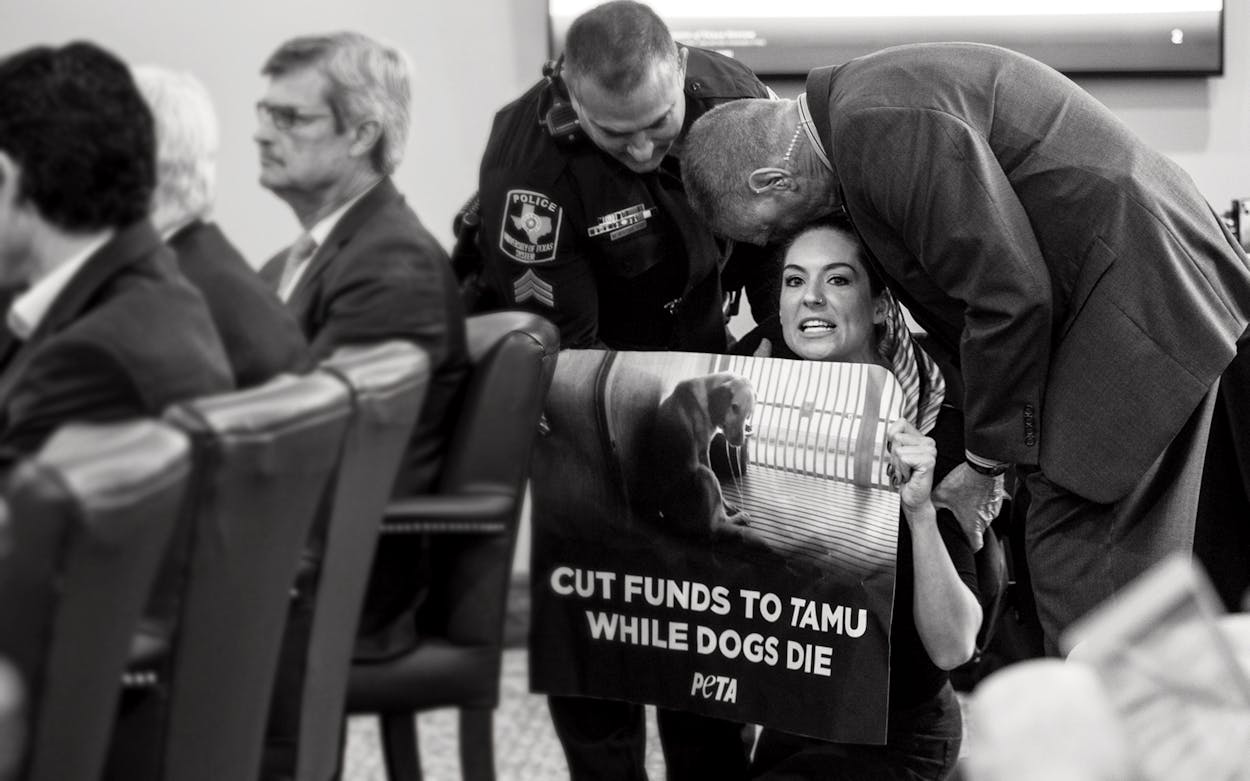In what could emerge as an interesting First Amendment test case, Texas A&M University was sued in federal court for allegedly censoring user comments on its official Facebook page. The lawsuit was filed by the Electronic Frontier Foundation, a nonprofit devoted to defending civil liberties online, on behalf of the People for the Ethical Treatment of Animals. The plaintiffs believe government-owned social media sites should be a forum for public discourse. Since 2016 PETA has been waging a campaign against alleged animal abuse at Texas A&M’s muscular dystrophy dog laboratory, and claims that the university’s social media team has been suppressing user comments about the lab.
“About 800,000 people have taken action through our online action alert about Texas A&M,” said Jeremy Beckham, a research associate in PETA’s Laboratory Investigations Department. “It seemed unusual that we would have such a large engagement on our end, but that nothing seemed to be showing up on A&M’s Facebook page.”
Through trial and error, Beckham and his colleagues discovered that A&M’s social media team seemed to be hiding any comment containing certain keywords: “PETA,” “abuse,” “dogs,” and several more. When A&M denied PETA’s open records request to see its social media filters, the organization turned to the Electronic Frontier Foundation. “An important question the courts are looking at now is government-owned social media,” said EFF attorney Adam Schwartz. “Our view is that government-owned social media is as important a place for members of the public to be able to speak as the streets and sidewalk are.”
In a written statement, A&M seemed to confirm that it was indeed filtering out negative comments about its animal labs, acknowledging that it has “taken reasonable steps to manage the University Facebook account in light of online attacks on our platform organized and encouraged by PETA. We have taken these steps only after these attacks of PETA and its supporters became so extreme that they significantly interfered with University business, the ability of our communications employees to perform their duties and the ability of other members of the Texas A&M community to have meaningful access to our Facebook platform.”
Schwartz argues that since A&M is a public university it has no right to restrict the speech of animal rights protesters, however annoying or inconvenient they might be. “What you have here is a public university, which is by definition dedicated to the free exchange of ideas, and they have created this channel of communication with thousands and thousands of followers,” he said. “This is exactly the kind of forum where the First Amendment requires the government to tolerate all kinds of speech, including speech that is criticizing the government.”
The controversy over A&M’s animal labs erupted when PETA released disturbing videos showing golden retrievers with muscular dystrophy kept in small cages and struggling to stand, or even eat. According to PETA, the videos were filmed by a whistleblower who worked at the lab, which is overseen by researcher Joe Kornegay. For decades, Kornegay has been breeding dogs with muscular dystrophy in hopes of finding a cure to both canine and human MD.
In response to the videos, A&M released a statement in 2016 saying the dogs “are treated with the utmost respect and exceptional care by board-certified veterinarians and highly trained staff.” But PETA’s campaign soon attracted national attention, with talk show host Bill Maher making a video appeal to A&M to stop the experiments. While A&M claims progress has been made toward a treatment for MD, PETA counters that experiments have “failed to produce a treatment to reverse the symptoms of MD, let alone a cure.” While a few other universities have similar dog labs, PETA says that A&M’s is the largest.
The current lawsuit isn’t about animal abuse, though—it’s about free speech. The EFF believes the case opens a new front in its battle for civil liberties online. “There was a century of litigation about free speech in public plazas, going back to the anti-union battles of the 1910s,” Schwartz said. “The struggle over free speech in government social media is really just beginning.”
A&M has announced that it will “vigorously defend against this lawsuit.”
- More About:
- Politics & Policy








